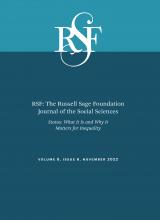Research Article
Open Access
To Forgive Is Divine? Morality and the Status Value of Intergroup Revenge and Forgiveness
Stephen Benard, Long Doan, D. Adam Nicholson, Emily Meanwell, Eric L. Wright, Peter Lista
RSF: The Russell Sage Foundation Journal of the Social Sciences November 2022, 8 (6) 122-139; DOI: https://doi.org/10.7758/RSF.2022.8.6.07
Stephen Benard
aAssociate professor of sociology at Indiana University
Long Doan
bAssociate professor of sociology at the University of Maryland, United States
D. Adam Nicholson
cPostdoctoral scholar at The Ohio State University, United States
Emily Meanwell
dClinical associate professor of sociology at Indiana University, United States
Eric L. Wright
eData analyst at Nexleaf Analytics, United States
Peter Lista
fDoctoral candidate in sociology at Indiana University, United States

REFERENCES
- ↵
- Accominotti, Fabien,
- Freda Lynn, and
- Michael Sauder
- ↵
- ↵
- ↵
- Bai, Feng
- ↵
- Bai, Feng,
- Grace Ching Chi Ho, and
- Jin Yan
- ↵
- Bales, Robert F.,
- Fred L. Strodtbeck,
- Theodore M. Mills, and
- Mary E. Roseborough
- ↵
- Barclay, Pat
- ↵
- Barclay, Pat
- ↵
- Barclay, Pat, and
- Stephen Benard
- ↵
- Beckerman, Stephen,
- Pamela I. Erickson,
- James Yost,
- Jhanira Regalado,
- Lilia Jaramillo,
- Corey Sparks,
- Moises Iromenga, and
- Kathryn Long
- ↵
- ↵
- Benard, Stephen, and
- Long Doan
- ↵
- Benard, Stephen,
- Long Doan,
- D. Adam Nicholson,
- Emily Meanwell,
- Eric L. Wright, and
- Peter Lista
- ↵
- Berger, Joseph,
- Bernard P. Cohen, and
- Morris Zelditch Jr.
- ↵
- Black-Michaud, Jacob
- ↵
- Böhm, Robert,
- Isabel Thielmann, and
- Benjamin E. Hilbig
- ↵
- Braithwaite, Sharon
- ↵
- ↵
- Collins, Randall
- ↵
- ↵
- Corey, Allison, and
- Sandra F. Joireman
- ↵
- Correll, Shelley J., and
- Cecilia L. Ridgeway
- ↵
- Coser, Lewis A
- ↵
- Deaux, Kay,
- Anne Reid,
- Kim Mizrahi, and
- Kathleen A. Ethier
- ↵
- Dennis, J. Michael
- ↵
- ↵
- ↵
- Fearon, James D., and
- David D. Laitin
- ↵
- Fiske, Susan T
- ↵
- Flynn, Francis J.,
- Ray E. Reagans,
- Emily T. Amanatullah, and
- Daniel R. Ames
- ↵
- Gould, Roger V
- ↵
- ↵
- Graham, Jesse,
- Jonathan Haidt, and
- Brian A. Nosek
- ↵
- Halevy, Nir, and
- Taya R. Cohen
- ↵
- Halevy, Nir,
- Tamar A. Kreps,
- Ori Weisel, and
- Amit Goldenberg
- ↵
- Hardy, Charlie L., and
- Mark Van Vugt
- ↵
- Harris, Shane,
- Ellen Francis, and
- Robyn Dixon
- ↵
- Henrich, Joseph, and
- Francisco J. Gil-White
- ↵
- Koenig, Biko
- ↵
- Kohler, Ulrich,
- Kristian Bernt Karlson, and
- Anders Holm
- ↵
- Leicht, Kevin T
- ↵
- Martin, John Levi
- ↵
- McAdam, Doug, and
- Sidney Tarrow
- ↵
- ↵
- ↵
- Milinski, Manfred,
- Dirk Semmann, and
- H. Krambeck
- ↵
- Miratrix, Luke W.,
- Jasjeet S. Sekhon,
- Alexander G. Theodoridis, and
- Luis F. Campos
- ↵
- Nelissen, Rob M. A
- ↵
- ↵
- ↵
- ↵
- ↵
- Pickett, Cynthia L.,
- Bryan L. Bonner, and
- Jill M. Coleman
- ↵
- ↵
- Ridgeway, Cecilia L
- ↵
- ↵
- Ridgeway, Cecilia L., and
- Hazel Rose Markus
- ↵
- Schelling, Thomas C
- ↵
- Sherif, Muzafer
- ↵
- Simmel, Georg
- ↵
- Smith, Kevin B.,
- John R. Alford,
- John R. Hibbing,
- Nicholas G. Martin, and
- Peter K. Hatemi
- ↵
- Spence, Michael
- ↵
- Strodtbeck, Fred L.,
- Rita M. James, and
- Charles Hawkins
- ↵
- Sumner, William G., and
- Albert G. Keller
- ↵
- Tingley, Dustin,
- Teppei Yamamoto,
- Kentaro Hirose,
- Luke Keele, and
- Kosuke Imai
- ↵
- Van Vugt, Mark,
- Robert Hogan, and
- Robert B. Kaiser
- ↵
- Willer, Robb
In this issue
To Forgive Is Divine? Morality and the Status Value of Intergroup Revenge and Forgiveness
Stephen Benard, Long Doan, D. Adam Nicholson, Emily Meanwell, Eric L. Wright, Peter Lista
RSF: The Russell Sage Foundation Journal of the Social Sciences Nov 2022, 8 (6) 122-139; DOI: 10.7758/RSF.2022.8.6.07





